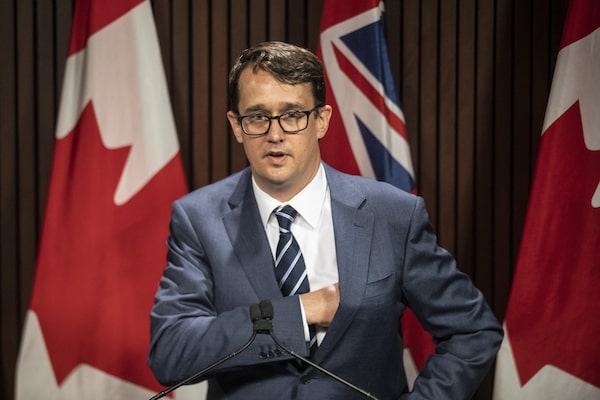
Ontario Labour Minister Monte McNaughton. The new law, if passed, would eliminate the work experience requirement for more than 30 professions and skilled trades.Chris Young/The Canadian Press
Immigrants to Ontario who qualify for certain trades and professions will no longer have to gain job experience in the province to receive work certification, under legislation to be introduced by Labour Minister Monte McNaughton.
The goal is to end the Catch-22 in which qualified immigrants come to the province with much-needed skills, but then are forced to take low-wage, low-skilled jobs because they cannot accumulate the required hours of work to receive the credentials they need in order to find employment in their fields.
Under the new rules, immigrant workers would still have to go through the same assessment and testing that all Ontario applicants must contend with in order to qualify for licenses. But the legislation aims to ensure they can no longer be barred from professions or trades solely because of their lack of Canadian work experience.
“These measures aim to level the playing field so that everyone who is qualified to work can contribute,” Mr. McNaughton told The Globe and Mail on Wednesday.
The new law, if passed, would eliminate the work experience requirement for more than 30 professions and skilled trades, from engineers to hair stylists, accountants to sheet metal workers, plumbers to teachers.
Workers in health care fields are currently not included in the new regulations, but the ministry said it was working to assess what professions might be included in the future.
The inability of immigrants to work in fields that match their qualifications has been a problem for decades. Licensing bodies are often reluctant to acknowledge experience gained overseas. And there are a limited number of apprenticeships and other work opportunities in Ontario. Those who are educated locally often receive preferential treatment.
This has forced immigrants either to return to school to acquire Canadian qualifications, or to abandon their fields. Previous efforts by governments at both the provincial and federal levels to convince licensing bodies to recognize qualifications gained overseas have had only limited success.
Doug Ford is completely wrong in his suggestion that immigrants are aiming to laze around
Searching for the American Dream? Go to Canada
The need for skilled workers is now especially acute. As the Canadian economy continues to thaw out in the wake of pandemic-induced lockdowns, baby boomers are retiring. There are too few new workers available to take their place, after decades of low fertility.
Between 270,000 and 290,000 jobs in Ontario are going unfilled every day because of ongoing labour shortages, the Ontario Labour Ministry estimates. “And the situation is only going to get worse,” Mr. McNaughton said. The skilled trades industry is expected to face a shortage of more than 100,000 workers over the next decade.
Canada has responded to the challenge by importing hundreds of thousands of skilled immigrants each year.
The new rules would require licensing bodies to complete the accreditation process for immigrants “in a reasonable time,” according to background materials provided by the ministry. Currently it can take as long as 18 months to process and approve an application.
The legislation also aims to streamline language proficiency requirements. And certifications could be further speeded up in a time of emergency, such as a pandemic.
The new legislation is one of a suite of announcements by Ontario’s Progressive Conservative government aimed at better integrating foreign workers into the province’s economy, such as new rules that protect temporary foreign workers from being exploited by employment agencies.
But Premier Doug Ford stirred up controversy on Monday when he added this caveat to newcomers: “If you think you’re coming to collect the dole and sit around, not going to happen. Go somewhere else.”
Mr. Ford refused to apologize for the remarks, which critics said reinforced prejudice against newcomers.
According to provincial data, although immigrants account for a third of Ontario’s workforce, only 25 per cent of internationally educated immigrants are employed in regulated professions for which they were educated and trained.
“By requiring certification of qualified workers, we are making sure that everyone contributes and our economy continues to grow,” Mr. McNaughton said.
For subscribers: Get exclusive political news and analysis by signing up for the Politics Briefing.
 John Ibbitson
John Ibbitson